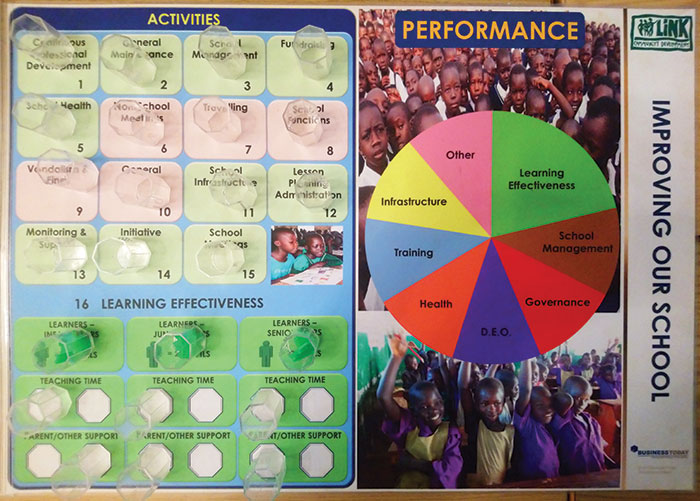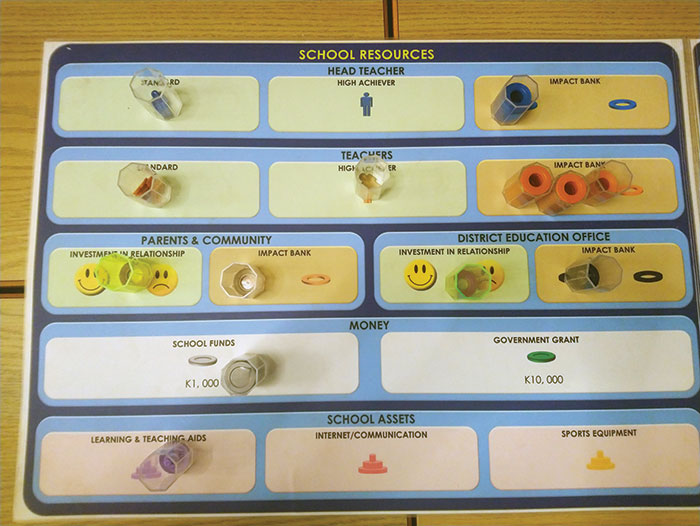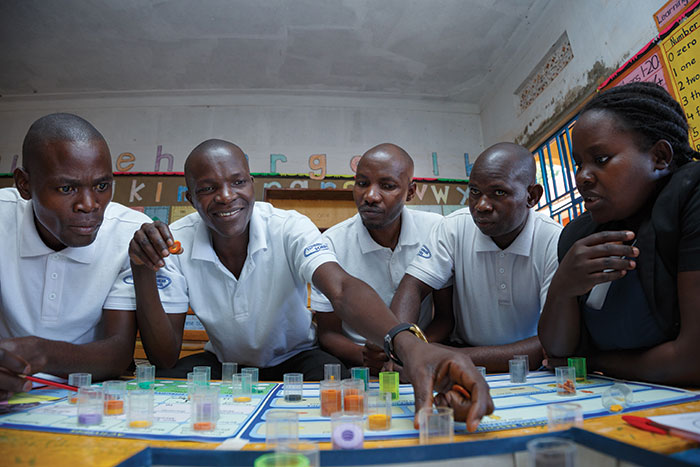Link Community Development works in Sub-Saharan Africa, advocating for community involvement in inclusive school development. Over the last five years, the organisation has been piloting a school improvement board game in Ethiopia, Malawi, and Uganda, aimed at helping the players understand how to manage their resources. The game, called the School Management Simulation Tool, brings the priorities of a range of community members into school planning and budgets. I was introduced to the game at a workshop at the 2019 UKFIET conference in Oxford, UK. The following is an overview of the workshop and the positives of the game for developing inclusive schools.
The aim of the game
The game is produced in local languages, with game events organised for groups around several boards. The game pieces represent the resources needed for an effective, inclusive school – including less-obvious resources like training, relationships, and time. As part of the game, the participants are given problems that they need to solve by moving their chips around the board and investing in resources as they go.

During the workshop at UKFIET participants were asked to decide how many ‘time chips’ should be spent on teacher development. We knew that a school needs a majority of skilled teachers to boost children’s learning, but training takes teachers away from teaching, and teaching time is essential. Most teams balanced this by only sending two teachers for training, one being the head teacher, but we reflected that this was an incomplete solution.

The game includes ‘chance’ cards that are picked up as participants play the game. These present common challenges such as funding cuts, inspectors’ visits or administrative demands. The teams were asked to invest school money in developing important resources for the school. For example, we considered whether we should set up email systems or buy sports equipment to motivate children. The next ‘chance’ card asked for documents to be sent to the Ministry of Education, but only teams which had invested in email capacity could respond in time. Those teams able to send the emails would be helped to get more funding. The game helped us to visualise resources like this in different ways, and think more long term about the benefits of potential investment.
Who can play the game?
The game can be played with teachers, to help them decide how to distribute their time or how to balance whole-class activities with extra support for the students who need it. It can be played with children to find out what stops them coming to school. Education officials can use the game to help them establish priorities for funding.
The game is often played with parents and school committee members. It can reduce power differences between literate leaders and less-educated parents. Instead of relying on documents, participants explore decisions through tangible objects, in the equalising setting of a game table. This can encourage people without much power to express what changes are needed for their school to work for everyone. This video shows examples in action:
- technical version: http://bit.ly/VideoByLink1
- shorter version showing the game being used in different ways: http://bit.ly/VideoByLink2
With good facilitation, the game can help to bring the priorities of a range of community members into consideration when school plans and budgets are developed. As well as training facilitators from local education authorities, Link has produced easy to follow guidelines on how to translate game decisions into school plans.
Facilitation to go beyond the game is also important. With the ‘sports versus email’ decision, one team at the UKFIET workshop discussed raising money for sports equipment, while spending their current budget on email. A facilitator could pick up on these discussions and encourage a committee to plan to fundraise.
Although responses have been positive, Link would like to capture more results of the school improvement game. They are particularly keen to understand:
- the extent to which school plans developed using the game are more inclusive;
- whether the games manage to bring out the voices of excluded children and adults.
Link will be sharing more evidence as the approach develops.

Contact
Helen is an EENET consultant who specialises in inclusive education systems. She can be contacted at: helenpinnock@eenet.org.uk
More information from Link about the game can be found at: http://bit.ly/AboutLinkGame
Email Samantha Ross from Link if you have further questions: samantha@lcd.org.uk
